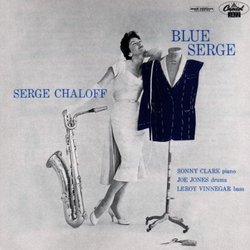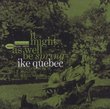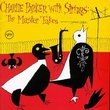| All Artists: Serge Chaloff Title: Blue Serge (Reis) Members Wishing: 0 Total Copies: 0 Label: Blue Note Records Original Release Date: 1/1/1956 Re-Release Date: 2/9/1998 Genres: International Music, Jazz, Pop Style: Bebop Number of Discs: 1 SwapaCD Credits: 1 UPC: 724349450523 |
Search - Serge Chaloff :: Blue Serge (Reis)
 | Serge Chaloff Blue Serge (Reis) Genres: International Music, Jazz, Pop
|
Larger Image |
CD DetailsSimilar CDs
|
CD ReviewsEssential Listening Jeffrey Giles | Forest Hills, NY United States | 01/08/2004 (5 out of 5 stars) "Blue Serge is essential listening. Not just for jazz fans, but for all lovers of music regardless of category. There is not one flaw in the entire recording. It is total perfection. Chaloff's performance on the baritone saxophone combines extreme technical mastery with tremendous emotional expression. It is also incredible how all the members of the band work so well together, even though they had never played together before this session.Even if you have sworn off all music except heavy metal, I suggest you obtain Blue Serge as soon as possible. Your attitudes toward music, and what it is capable of achieving, will never be quite the same after listening to this album." A Blue Bird in Black Sheep's Clothing Samuel Chell | Kenosha,, WI United States | 10/12/2006 (5 out of 5 stars) "I'd rank this one with the classic "Art Pepper Meets the Rhythm Section" except, given the comparatively small recorded output by Chaloff, this session has to be elevated to an even more exclusive place among essential jazz recordings. Along with the earlier, recently reissued "Boston Blow-Up," "Blue Serge" is the meager evidence upon which Chaloff's legacy and reputation must rest, apart from his role as one of Woody Herman's "Four Brothers," arguably the most legendary saxophone section (with Getz, Steward/Cohn, and Zoot Sims) in the history of the music.
"Boston Blow-Up" demonstrated the extraordinary cohesion and rapport Chaloff was capable of as a member of a section, in which he's as integral, balanced, and tasteful as Duke's Harry Carney. On the other hand, "Blue Serge," made just weeks before his partial paralysis due to spinal cancer, is an unrehearsed meeting during which Serge's inventive melodic lines, various vibratos and articulations, wide dynamic range, and contrasting rhythmic passages--alternating lyric and dramatic styles--produce a tour de force that transcends virtually any other recording that might be described as a "blowing session." To any listener who doesn't require tight arrangements and short solo spots and who can appreciate the unrestrained mastery of a major improvisational artist for whom the baritone saxophone is as natural and expressive as the human voice, "Blue Serge" has to be given a slightly higher priority than "Boston Blow-Up." One recording session does not make a player the best on his instrument, but it's sufficient for this listener, in any case, to proclaim Chaloff a player second to none. Just listen to his fluid and dazzling technique on the first two tunes--on which he plays with the smoothness and richness of Harry Carney combined with the swing of Mulligan and the monster post-Bird chops of Pepper Adams. Then dig the follow-up--a somewhat trite tune ("Thanks for the Memories") that Chaloff transforms into a multi-textured, fascinating ballad opus. The last tune, "How About You," was not even included on the original LP, yet it's as soulful and deeply felt as anything on this recording, easily the definitive instrumental version of this standard. The rhythm section--Philly Joe (despite the cover's misleading reference to him as "Joe Jones"), Sonny Clarke, and Leroy Vinnegar--was as hip as any on the West Coast. I'm blown away by Chaloff's ability to play with a Paul Desmond lightness one moment, then with a Johnny Hodges lushness the next, then with Hawk-like growls and plosives, and finally with a bracing and resonant, foundation-building bass tone the next, suddenly filling the massive chambers of his big baritone horn with unexpected reserves of purposeful breath. I've never heard anything quite like Serge's solo on "I've Got the World on a String." One moment he's charming his mistress/horn with a seductive, alluring tone and the next he's wrestling it to the floor, kicking, boxing, scraping and jabbing until he's got everything under control. Serge was apparently the black sheep in his family. With a father who was a concert pianist and a mother who was a piano teacher to young prodigies (Hancock, Jarrett, Corea, even Shearing), Serge wound up with terrible addictions to booze and heroin--and an outlandish horn that he played with as much brilliance and striking originality as Charlie Parker did the miniature version. In fact, Serge reversed all priorities, fathering and bringing so much respect to black sheep that the rest of us can only be eternally grateful he didn't wind up in white wool." |

 Track Listings (8) - Disc #1
Track Listings (8) - Disc #1
